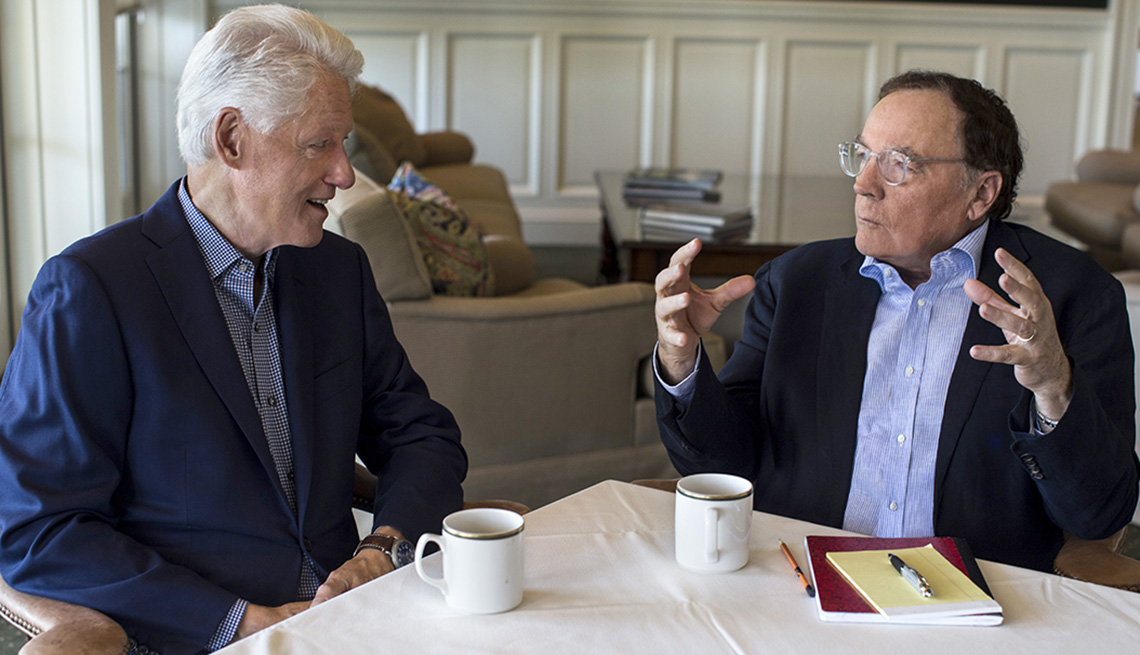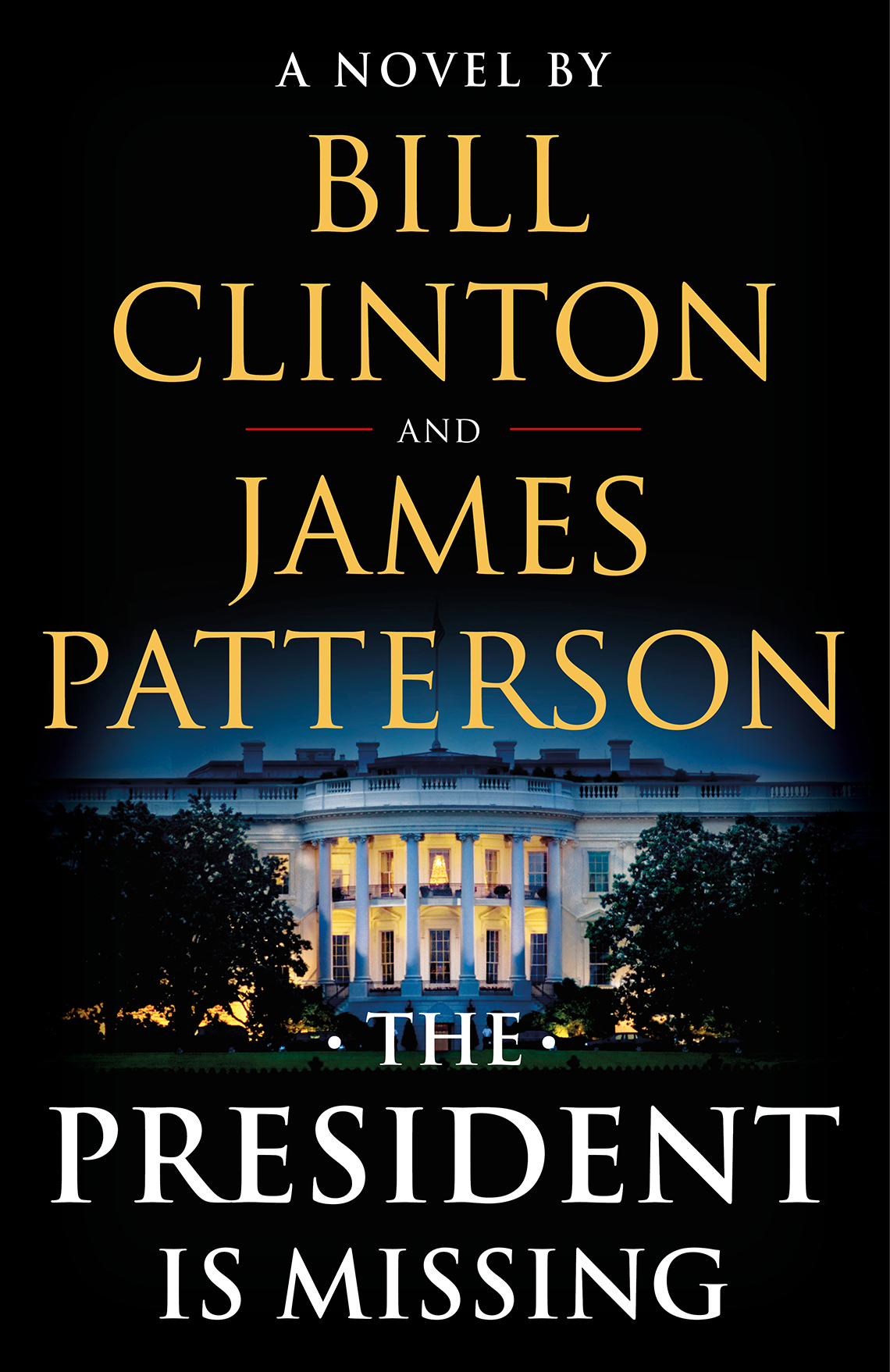Have Bill Clinton and James Patterson Created a Best-Seller?
The president and the storyteller talk about their new book, ‘The President is Missing’

MILLER MOBLEY
President Bill Clinton and author James Patterson have collaborated on an action-packed thriller with a plot ripped straight from the political headlines.
A few years ago, a newspaper asked the novelist and publishing juggernaut James Patterson which writers he’d most like to meet. He replied James Joyce, Bill Clinton and Hunter S. Thompson.
Within weeks, Clinton’s people reached out: The former president would be in Florida, where Patterson lives most of the year. Would Patterson like to meet him? “So we spent a couple of hours down in Boca Raton,” Patterson recalls. “And, I mean, who wouldn’t enjoy the hell out of that? It was an experience of a lifetime for me.”
“I just wanted to meet Jim,” Clinton chimes in. “I read a lot of fiction, and a huge number of political thrillers — I mean, a lot. And I like a series, so I love his Alex Cross series. I love his Michael Bennett series, the idea of an Irish cop with 10 kids — I’m a sucker for that kind of stuff.”
In 2016, when their mutual friend, superagent Bob Barnett, suggested they write a book together, the two men jumped at the chance. Their global thriller, The President Is Missing, hit shelves on June 4.
The gist of the 528-page, 128-chapter potboiler is that — spoiler alert! — a massive cyberattack, called Dark Ages, is about to be unleashed against the United States by parties unknown. The result would be catastrophic, shutting off all our power, wiping all computers, eliminating everyone’s wealth. Five terrible ticktock days ensue — featuring a high-level traitor, a female assassin, and all kinds of word and bullet battles, while the fate of the nation hangs in the balance. Can President Jonathan Duncan save America?
The book should please the fans of both men and then some. Packed with action and the usual Pattersonian red herrings and blind alleys, it also retains a certain dignity, with a presidential voice of Clintonian timbre, no matter how much the two men deny that their fictional President Duncan resembles our 42nd commander in chief. Indeed, nerdy expositions on the details of cyberhacks, international diplomacy and even, yes, the Medicaid coverage gap ensure that readers will very much see the hands of both authors in the prose.
AARP The Magazine executive editor William W. Horne recently sat down with the authors at President Clinton's office in Upper Manhattan. Clinton and Patterson, both 71, were friendly and assured, and the mood was buoyant, even exuberant. The book was essentially done and is super topical: The day before the interview, President Trump nominated the first female CIA director, Gina Haspel; the day after, the Trump administration accused Russia of hacking our power plants and electric systems. In Missing, the FBI and CIA chiefs are women and, yes, a certain superpower is messing with our water and other critical facilities.
Prologue
Q: First, congratulations. I found your book to be a smart, twisty thriller — a terrific read and very contemporary.
Patterson: Don’t be afraid to put that right in the article. [Laughter]
Q: How did the collaborative process work between you two?
Clinton: First of all, Jim’s the greatest storyteller in history. So he didn’t need my help to tell a story. Patterson: The president’s a great storyteller.Clinton: Well, I grew up in the last generation of politicians who were born without televisions, and with family members who were highly intelligent but without much formal education. All of my entertainment was storytelling. But Jim’s good like nobody else. So it was his idea that the president is involved in a crisis.
If you would like to read more of the interview, go to:
https://www.aarp.org/entertainment/books/info-2018/bill-clinton-james-patterson-interview.html
https://www.aarp.org/entertainment/books/info-2018/bill-clinton-james-patterson-interview.html
Inside this interview - this is of interest!
Best Book for Young Kids
Clinton: I like that one you did, Big Words for Little Geniuses.Patterson: Yeah, Big Words for Little Geniuses — my wife and I wrote that. Everybody thinks their kids are geniuses. And, to some extent, they are, in the sense that they can always exceed what you think they can do, so the idea of an alphabet book where words are like “catawampus” … I think the best books I do are the kids’ books. I have one coming out in October. The Albert Einstein estate came to me — they wanted to do something that would really keep Einstein alive with little kids and be entertaining. And they gave me the name Max Einstein — it’s the only thing they gave me. And when I sat down to pitch the book, I said, “The first thing I want to tell you about Max Einstein is she’s a girl.” And they went, “We love it.” And that’s what it should be, because we’re still evolving in terms of women and science and math. So my hope for this book, and I’ll go around the world with it, is it’s going to turn kids on to science, it’s going to demystify it, it’s going to make it entertaining. And there used to be a time when half the scientists you met, they’d say, “How did you get turned on to it?” “By reading science fiction.” [Reading] is how you open brains up.
Second Career: From Adman to Book Mogul
Q: We’re big on second and third acts at AARP, and you’re sort of a master of that, Jim, having given up a very successful career in advertising to write books. What advice would you give to people who are contemplating such a second or third act?
Patterson: It’s a combination of, I think, “Be brave” and “Be realistic.” It’s like a kid wants to be a ballerina and she weighs 200 pounds. You could still be a dancer, you can love dance, just be realistic about it. At the same time, be brave, and don’t be afraid to try stuff. People get afraid of making fools of themselves. It’s like golf: “Oh, I don’t want anybody to see me hit a bad shot.” Who cares? I think realism has to play a part in it — just what is possible at what age, what your skills are. You should know your skills at that point. And ask: Is this going to be a job or is it going to be an avocation? Avocations are cool, too.
Book Excerpt: ‘The President Is Missing’
Augie, a cyberterrorist-turned-U.S. ally, briefs President Jonathan Duncan (the “I” below) and a group of world leaders about a potential cyberattack dubbed Dark Ages.
The virus is essentially what you call a wiper virus,” says Augie. “[It] erases — wipes out — all software on a device. Your laptop computers will be useful only as doorstops, your routers as paperweights. The servers will be erased. You will have no internet service, that is surely true, but your devices will not work, either.”
Dark Ages.
“And backup files are no help,” says [Germany’s intelligence chief] Dieter Kohl, shaking his head. “Because you have infected them as well.”
“Of course. The virus has been uploaded onto the backup files by the very act of backing up the systems on a routine basis.”
“They’re time bombs,” I say. “They’ve been hiding inside devices waiting for the moment they’re called into action.”

LITTLE, BROWN AND KNOPF
“Yes.”
“And that day is today.”
“Give us an idea of … ” [Israel’s Prime Minister] Noya Baram rubs her temples.
Augie begins to stroll around again. “Elevators stop working. Grocery-store scanners. Train and bus passes. Televisions. Phones. Radios. Traffic lights. Credit-card scanners. Home alarm systems. Laptop computers will lose all their software, all files, everything erased. Your computer will be nothing but a keyboard and a blank screen.
“Electricity would be severely compromised. Which means refrigerators. In some cases, heat. Water — well, we have already seen the effect on water-purification plants. Clean water in America will quickly become a scarcity.
“That means health problems on a massive scale. Who will care for the sick? Hospitals? Will they have the necessary resources to treat you? Surgical operations these days are highly computerized. And they will not have access to any of your prior medical records online.
“The economy in this country will screech to a halt. Entire industrial sectors dependent exclusively on the internet will have no means of surviving. The others will be severely compromised. The impact will inevitably lead to massive unemployment, an enormous reduction in the availability of credit, a recession the likes of which would make your Depression in the 1930s look like a momentary hiccup.”
“The United States will be vulnerable to attack in ways it has never been before,” he says. “Your military defenses will be at 19th-century levels against enemies with 21st-century capabilities.”

























